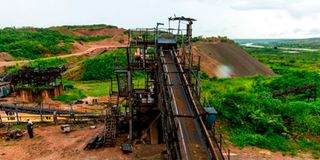DR Congo diamond mining giant struggles to revive its glory days

A general view of the Disele diamond washing plant of Miba (Minière de Bakwanga) in Mbuji-Mayi, Kasai region in the Democratic Republic of Congo on May 3, 2021.
Mbuji-Mayi
Once the home of Democratic Republic of Congo's state diamond company Miba, the town used to be filled with free-spending miners and their families, who brought a giddy touch of prosperity to remote Kasai-Oriental province.
But at the end of last century, Miba -- the Bakwanga Mining Company -- began to go into a long downward spiral, taking the town with it.
Poor management, crumbling infrastructure, embezzlement and looting, especially during the two Great Congo Wars between 1997 and 2003, left Miba crippled by debt and at the mercy of plummeting commodity prices.
It shut down at the peak of the 2008 financial crisis, resuming operations in 2011, but remains a shadow of its former self.
From an annual output averaging six million carats -- mainly of industrial diamonds -- in the early 2000s, production was no more than 500,000 carats in 2008 and half that in 2011.
Today the situation in Mbuji-Mayi is a far cry from the 1980s, when some 40,000 workers and their families drew their sustenance from the company.

A worker driving a front loader collects ore in the open air at the Miba (Minière de Bakwanga) diamond mining site in Mbuji-Mayi, Kasai region in DR Congo on May 3, 2021.
Employees’ pay
Miba owes several months of back pay to its employees, according to staffers who requested anonymity.
"When the company was still operating, the roads and houses were maintained. When the corrugated roofs were rusted, they were automatically replaced," said one resident, Mpoy Bilenga, outside his dilapidated home.
Bilenga, a former driver for the company, has been retired since 2012 but says he is still waiting to receive a pension for "services rendered".
But the 70-year-old is not banking on it.
"We don't know our fate... several of us have died without receiving a pension," he said.
Set up in 1961, Miba is 80 per cent state-owned, while a Belgian company, Sibeka, has a 20 per cent stake.
A government audit published in May 2020 revealed "serious dysfunction".
Injection of cash
Last August, President Felix Tshisekedi, who himself hails from the Kasai region, moved to release $5 million "to revive this company that was once the pride of the entire nation".
The injection of cash has allowed Miba to get back on its feet, the company's technical director Raphael Mukadi Tshindundu told AFP, but added that it was not enough.
"The mine is operational, exploitation is underway, but at a minimal level," he said.
The first $3 million went to "rehabilitating" a diamond processing plant at Disele and the purchase of a new one with an hourly capacity for 200 tonnes of ore, Tshindundu said.
But the plant, manufactured in China, is still to be assembled at the Disele site, stored in containers or in the open air for now.
Operations have resumed in only one of the company's 13 zones.

Chico Kalonji, a buyer and dealer inspects his diamonds at the Lupatapata mini diamond market on the outskirts of Mbuji-Mayi in the Democratic Republic of Congo.
Diamond reserves
Joseph Kazadi, Miba's operations manager, said the zone "may easily have more than 40 million carats (of diamonds) and by itself represents 78 per cent of Miba's kimberlite reserves."
The extracted ore is trucked to the Disele washing plant, about 10 minutes away, on a clay road.
Mud and sand are washed away before the ore is passed through a vibrating sieve at a rate of 50 tonnes an hour, working 24/7, Mukadi said.
The stones then head to a "diamond sorting office" -- a modest space that looks like the inside of a container but is one of the most closely monitored in the entire country.
Thorough searches
Employees and miners undergo thorough searches on their way in and out, leaving their bags and phones at the door.
Silence reigns as a dozen employees bend over their work, sorting the stones according to their quality.
Meanwhile, the resumption of activity by Miba appears to have little impact on the people of Mbuji-Mayi.
"If Miba's activity had really resumed, we would have felt it, life would have resumed, money would circulate," said Alphonse Ilunga, a diamond buyer at the nearby Lupatapata market, where diamonds gathered by freelancers are bought and sold.
For her part Regine Kanyeba, the wife of a Miba worker, has just one demand: "That they pay their workers' wages so we can pay our children's school fees."





